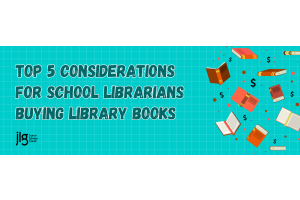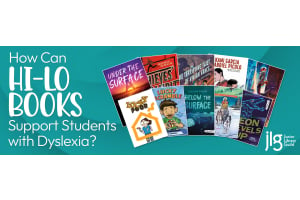Help Foster a Love of Reading this Summer!


Summertime is HERE, and that means summer reading is well underway. While some readers are laying by the pool with their books, or taking their favorite stories to barbecues and picnics, we know that other students might need a little extra encouragement. In recently released data from NAEP, the number of students who read daily for fun are at an all-time low; only 14% of students reported reading for fun almost every day. This statistic is alarming, especially when there are so many great summer reads to go around! If your students or patrons are having a difficult time picking up a book, they might need an extra reminder as to why reading for pleasure is so impactful to their overall growth and success.
BONUS: Score JLG’s Summer Must-Read List—categorized by grade level—down below!
Reading Aids Early Development and Continued Academic Success
Reading has the power to transform lives, and research proves that children who start reading at an early age build important social-emotional learning skills and use their creativity more often. Literature even helps early readers interact with the world and make sense of their surroundings! Furthermore, those who read often are likely to keep reading and improve various language skills including…
- -Grammar
- -Vocabulary
- -Comprehension
- -Writing ability
In a study titled, “What Reading Does for the Mind”, researchers concluded that the positive cognitive outcomes of reading continue to impact the reader even after they have shut their book; the tremendous effects of reading extend long beyond the page! Researchers from the study explained that “[People] who read well are likely to read more, thus setting an upward spiral into motion.” This “upward spiral” is demonstrated in reader’s higher earned test scores than nonreaders, overall academic success, and an increase in general knowledge. Students who read will acquire skills that last long into adulthood, so it’s important to help build these skills early on.
Pleasure Reading Increases Motivation and Engagement
In order to “examine the relationship between a love of reading and literacy proficiency,” the Vermont Agency of Education released research that explored two questions:
1. Does literacy proficiency lead to a love of reading?
2. If so, what is the strength of that relationship?
In their findings, they suggest that an “intrinsic motivation”—like the joy of reading— can be a powerful and driving force that helps motivate students and encourages them to stay engaged with content:
…Frequent reading improves reading ability. Feelings of competence increase a person’s desire to engage in an activity, and reading is no exception. Additionally, deriving a sense of pleasure from an activity also promotes a person’s engagement in that activity, while continued practice promotes growth in the development of a particular skill – whatever that skill may be. Thus, students who enjoy reading and feel successful are likely to read more; whereas more reading strengthens a student’s reading proficiency, thus contributing to an overall ease of experience that can lend itself to an increased sense of satisfaction with reading as a whole. A satisfying experience is likely to encourage further participation in said activity, so readers who feel successful will continue to read and become more proficient as they do so.
Therefore, the more students read, the more likely they are to continue building their skills and feel confident in doing so; as students become more confident in their reading ability, the act of reading will become more pleasurable, thus keeping them motivated. This study proves how reading can become a positive and pleasurable life cycle that keeps students engaged and wanting to learn!
Reading Fosters Empathy, Insight, and Understanding
When students pick up a book, they can transport themselves to a new land where they encounter fresh ideas and perspectives—all while never leaving the safety of a page. Students may read about new cultures, traditions, and customs, imagine how others live, and challenge themselves to think differently. According to a study titled, “How Does Fiction Reading Influence Empathy? An Experimental Investigation on the Role of Emotional Transportation,” findings showed that reading fiction helps people empathize. Through this study, researchers learned that when people read fiction, they become emotionally attached to the story and thus become more empathetic to the characters in the book. This skill can help students make sense of new situations, consider how others are feeling, and discover new truths about the world around them.
Conclusion
Reading is imperative for the overall growth and success of students, but what’s most ideal is helping students find content that they enjoy reading. We know some readers can be more reluctant than others, and that’s why we offer 90 categories of books here at JLG—there’s truly something for everyone! If your library needs a summertime-pick-me-up, check out these great titles and add them to your next JLG book box. These titles will fly off your shelves!
JLG’s Elementary Summer Must-Read List

JLG’s Middle School Summer Must-Read List

JLG’s High School Summer Must-Read List










